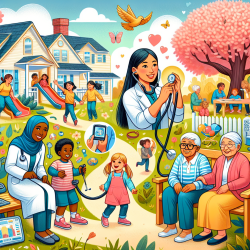The recent research article, "Communicative and Discursive Perspectives on the Medication Experience," provides a comprehensive exploration of how communication shapes patients' experiences with their medications. This research offers valuable insights that practitioners can use to enhance their skills and improve patient outcomes, especially in pediatric settings.
Understanding the Communication Model
The study underscores the importance of a broad, ethnographic-sociolinguistic model of communication, which considers various factors like actors, messages, mediums, genres, and contextual elements. Practitioners can benefit from understanding these elements to tailor their communication strategies effectively.
Key Takeaways for Practitioners
- Holistic Communication: Recognize that the medication experience involves more than just the doctor-patient interaction. It includes personal circles, labeling, promotion, websites, and even the patient's inner conversations. A holistic approach to communication can provide a more comprehensive understanding of a patient's experience.
- Patient-Centered Values: The shift towards patient-centered care highlights the need for effective communication strategies. Practitioners should focus on building trust and understanding with their patients, considering their values, beliefs, and cognitive traits.
- Clear Messaging: Early models of communication have evolved to recognize the complexity of conveying messages. Practitioners should strive for clarity and simplicity in their communication to avoid misinterpretations.
Implementing Research Insights
Practitioners can implement the research outcomes by:
- Training and Development: Engaging in continuous professional development to enhance communication skills, particularly in the context of medication experiences.
- Patient Education: Developing educational materials that are clear, concise, and tailored to the patient's needs and literacy levels.
- Feedback Mechanisms: Establishing feedback loops with patients to ensure that the intended messages are received and understood correctly.
Encouraging Further Research
The research also highlights areas for further investigation, such as the impact of sound symbolism in drug names and the dynamics of pharmacist-patient interactions. Practitioners are encouraged to engage in or support research initiatives that can provide deeper insights into these areas.
Conclusion
By understanding and implementing the communicative and discursive perspectives on the medication experience, practitioners can significantly improve patient outcomes. Effective communication is key to building trust, ensuring comprehension, and fostering a positive medication experience.
To read the original research paper, please follow this link: Communicative and Discursive Perspectives on the Medication Experience.










